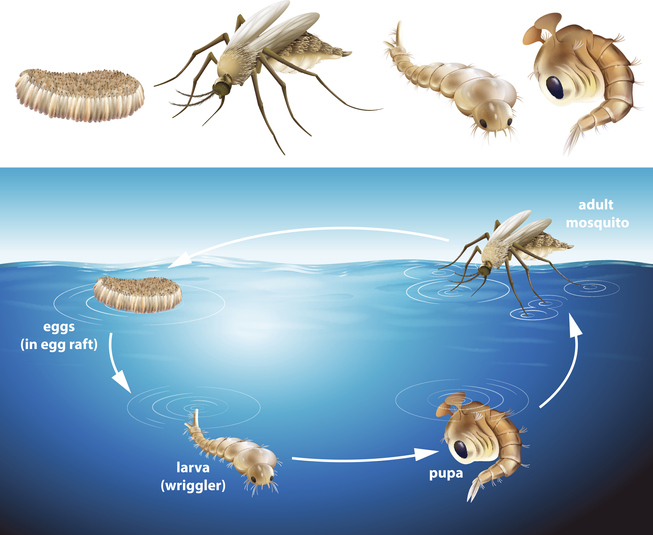Your Cart

The Mosquito Life Cycle, Explained
What You Need to Know About Mosquito Development
We’re all familiar with the physical characteristics of mosquitoes -- the brown body, long slim legs, a mouthpiece used to pierce the skin, and of course, a pair of wings. But mosquitoes do not look this way for all of their lives. In this week’s blog, we break down the four stages of the mosquito life cycle so that you can identify mosquitoes before they become a problem. Read on to learn more! The first stage of the mosquito life cycle is the egg stage. Here, female adult mosquitoes lay their eggs – approximately 100 or so – in a wet area, such as a pond or watering can. The eggs are small and black and resemble specks of dirt. Homeowners should note that mosquito eggs can withstand less-than-ideal weather conditions very well. When eggs are securely attached to the container they were laid in, they can survive drying out for up to 8 months! This is why it is so important to be able to identify mosquito eggs in this stage, as they must be purposefully removed. The second stage of the mosquito life cycle is the larva stage. As the mosquito eggs begin to hatch, larvae emerge. These aquatic, worm-like organisms emerge from their eggs after the eggs are submerged in water. The larvae will stay in this stage for as little as 5 days, feeding on microorganisms in the water and molting three separate times. After the final molt, the larva will develop into a pupa. Pupae look similar to larvae in that they have a worm or shrimp-like body, but pupae have a much larger ‘head’ that appears more ball-like. Pupae will continue to develop until the adult mosquito begins to emerge, for about 2-3 days. At this point, the adult flying mosquito will leave behind its pupal skin in the water. The fourth and final stage of the mosquito life cycle, the adult stage, describes what we generally think of as mosquitoes. The adult stage begins when the mosquito has emerged from its pupal skin and begun to feed. Male adult mosquitoes will feed on nectar, while female mosquitoes will hunt for blood from human and animal sources – this is the main stage that us humans need to worry about! If you have noticed the presence of mosquitoes on your property, don’t delay. Contact your local Mosquito Hero professionals to request a free quote today.
 English (CANADA)
English (CANADA) English (USA)
English (USA)